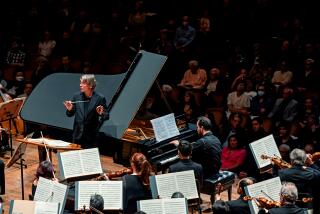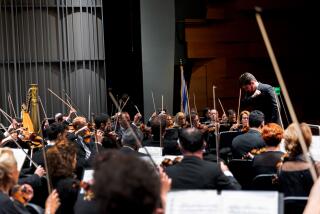MILTON BABBITT IS STILL MAKING MUSIC HIS WAY
- Share via
Age has not slowed Milton Babbitt.
Pose a brief, straight-forward question to the pioneering American composer, who turns 70 in May, and invariably he will respond with a lengthy, lucid essay, delivered at break-neck speed.
“I don’t feel old, though I have all the evidence,” he says with a chuckle. “I suppose I can’t avoid feeling like a senior-citizen composer.”
The Princeton University professor-emeritus is in the midst of a rare local visit, lured by a birthday tribute at CalArts tonight and Saturday. Expressing pleasure mixed with bemusement at the attention foisted on him, he notes, “When you consider the music I’ve written, I have been very fortunate.”
Babbitt admits that his 12-tone compositions and his ground-breaking electronic works dating back to the ‘50s are not exactly musical pablum for the masses. Simply put, he writes to please himself: “Even so-called popular composers don’t really care what an audience likes. In the end, you write for yourself. Some may call it self-indulgence, but at my age, who better to indulge?”
Taking advantage of his role as “senior-citizen composer,” Babbitt bestows some advice to younger music-makers bent on such self-indulgence. His counsel: Don’t.
“There are young composers everywhere, but so few of them are getting attention. And so many of them seem unconcerned. They only worry about getting some friends to play their music. But they can’t remain idealistic for long. I maintain that, to survive, a composer must teach. With so few university positions, why are there so many composers? I wish I had an answer.”
For the younger generation of today, the proper direction to travel is clear as a bell to Babbitt. “There’s no doubt--the future is with the computer. It came along too late for me. I’ve never touched one. But I can’t see how it could be otherwise.”
As one who has worked for decades in both instrumental and electronic media, Babbitt is well-versed in the advantages and disadvantages of each. True to form, he proceeds to carry on a one-man debate--taking both sides.
The human element is an important one, he agrees. But is the prospect of realizing a perfect performance--albeit one produced by a machine--too enticing to pass up?
Yes and no.
“My life has been based on the closest collaboration with the performer. It’s one of the greatest gratifications. But another gratification is to walk into an electronics studio with an idea, and then walk out with the finished tape under my arm.
“When a player misses a note (in performance) is it still the same piece? It’s the old boat analogy. If you remove the planks one by one, when does it stop being that boat?
“Now consider what goes on (with electronic composition): You inform a totally dumb machine of all aspects of your music. You could never do that with a performer.
“And, for the listener, it is the most direct of experiences. The only intervention between composer and audience is the loudspeaker. Even a piano offers more interference.
“Performers, too, favor working with electronics, I believe. They don’t have to hire an accompanist.”
Quickly, Babbitt then switches to the opposite view.
“Players,” he admits, “can come up with fascinating questions, as well as interpretations, ones you never thought of.” A solo performance of his music “gives the greatest joy to me--more than hearing a piece of mine played by the New York Philharmonic.”
The pleasures of such one-on-one collaborations help to explain a recent flood of purely instrumental music--particularly works for the piano.
“It has to do with the performer,” he admits, referring to pianist Robert Taub, who will present the complete piano music on Saturday (and who recently recorded same for Harmonia Mundi). “He is a truly amazing musician,” the composer notes. “Some of his interpretations are so different than what I could have imagined possible.”
Of course, Babbitt notes with typical matter-of-factness, there’s another reason he hasn’t toyed with his synthesizer of late: “I can’t get to it during the day. The problem is, it’s still on 125th Street--a rough place to be at night.”
More to Read
The biggest entertainment stories
Get our big stories about Hollywood, film, television, music, arts, culture and more right in your inbox as soon as they publish.
You may occasionally receive promotional content from the Los Angeles Times.










